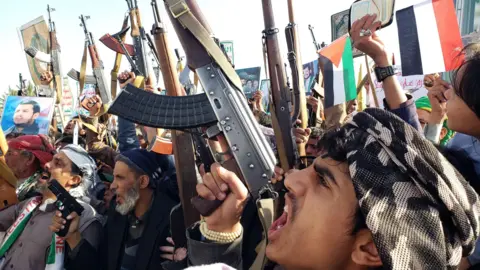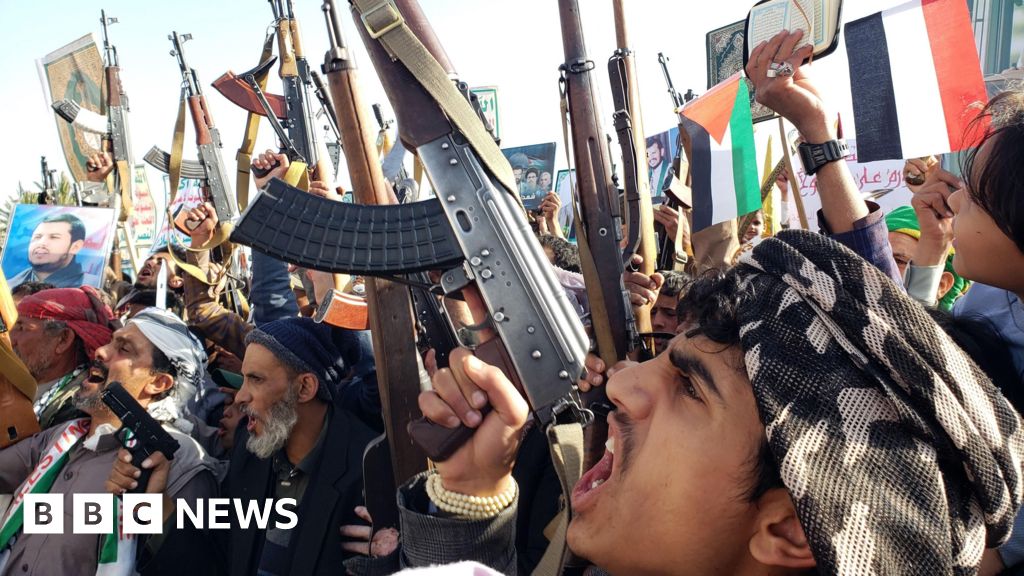A Houthi political official said that despite the intensification of Israeli airstrikes in Yemen, the Houthis remain united with the Palestinians in continuing their attacks on Israel.
Mohammed al-Buhaiti told the BBC that the Houthis would “escalate military targeting against Israel” until they stopped what they called “genocide in Gaza.”
On Thursday, Israeli warplanes attacked the international airport in Yemen’s capital Sanaa, as well as ports and power plants on the Red Sea coast, killing at least four people.
Israeli Prime Minister Benjamin Netanyahu has warned that the country’s response to more than a year of missile and drone attacks by Iranian-backed groups is “just beginning.”
Overnight, the Houthis fired another ballistic missile at Israel, but the Israeli military said the ballistic missile was intercepted before it could reach Israeli territory.
The UN Secretary-General said he was “gravely concerned” by the escalating situation.
He also called attacks on airports and ports “particularly worrying” and warned they posed “a significant risk to humanitarian operations” in the war-torn country.
The Houthis, who control northwestern Yemen, began attacking Israeli and international shipping vessels shortly after the war between Israel and Hamas began in the Gaza Strip in October 2023.
Israel has launched four attacks against the Houthis since July in retaliation for what the Israeli military says was 400 missiles and drones launched into the country from Yemen, most of which were shot down. Conducting air strikes.
The United States and Britain also carried out airstrikes in Yemen in response to attacks by the group on dozens of commercial ships in the southern Red Sea and the Gulf of Aden.
 EPA
EPAMohammed al-Buhaiti, a member of the Houthi politburo, told the BBC’s NewsHour program on Friday that after fighting what Yemenis called “instruments” during the Yemeni conflict, they are now working with the United States, Britain and Israel. “We’re moving towards direct confrontation,” he said. 10 years of civil war. He appears to be referring to the Saudi-led coalition that intervened to support the Yemeni government when the Houthis seized control of Sanaa in 2015.
“We are committed to continuing military operations in support of Gaza and will not stop until the crimes of genocide and the siege of Gaza stop. We will escalate our military targeting against Israel.” Israel has strongly denied that its forces are committing genocide against Palestinians in the Gaza Strip.
Buhaiti said the Houthis do not need support from Iran, whose allies Hamas and Hezbollah have been decimated in the past 14 months of war with Israel.
“We are capable enough militarily, economically and even in terms of popular support to survive this battle even on our own,” he asserted.
He also said the Houthis expected an escalation by the United States after President-elect Donald Trump takes office next month, but warned that it would “backfire”.
Israel’s prime minister said Thursday night that his country had “attacked targets of the Houthi terrorist group” as part of what it called a “war of salvation.”
Prime Minister Benjamin Netanyahu said: “We are determined to cut off the terrorist wing of Iran’s axis of evil. We will persist until we accomplish our mission.”
Meanwhile, Defense Minister Israel Katz warned that Israel would “hunt down all Houthi leaders” as it had done with Hamas and Hezbollah leaders.
UN spokeswoman Stephanie Tremblay said Secretary-General António Guterres remains “deeply concerned about the risk of further escalation in the region and urges all parties concerned to cease all military action and exercise the utmost restraint.” I once again urge you to exercise your authority.”
The Israeli military said its airstrikes targeted Houthi “military infrastructure” at Sana’a International Airport and the Hiz Yaz and Ras Kanatib power plants, as well as in Hodeidah, Salih and Ras, which were used to smuggle Iranian weapons.・It was the infrastructure of the Red Sea port of Kanatib.
A Houthi military spokesman said only civilian facilities were attacked and the attack resulted in deaths and property damage.
The Houthi-affiliated Sabah news agency reported that three people were killed at Sana’a airport and another three in Hodeidah province.
However, Yahya al-Sayani, deputy transport minister in Yemen’s Houthi-controlled government, announced at a press conference on Friday that the death toll was four.
He said Sanaa airport’s control tower, departure lounge and navigation equipment were damaged in the attack, and accused Israel of violating international law and aviation regulations.
Flights at the airport resumed at 10am (7am GMT) on Friday, he added.
The attack on the airport occurred just as the Director-General of the World Health Organization (WHO), Dr. Tedros Adhanom Ghebreyesus, was about to board a United Nations Humanitarian Aviation Service (UNHAS) aircraft at the airport.
Dr Tedros said one crew member of the UN airliner was seriously injured and was flown to Jordan on Friday after undergoing surgery at a local hospital.
“We deeply appreciate the UNHAS team’s service and swift evacuation from Yemen,” he wrote to X, adding that “attacks against civilians and humanitarian workers everywhere must stop.”
The WHO director-general was leading a high-level delegation to Yemen to assess the humanitarian situation in the country, which has one of the world’s highest cholera outbreaks and 80% of the population requires some form of aid. He was also asked to negotiate the release of 16 UN personnel held by the Houthis.
It is normal practice for the United Nations to share details of humanitarian flights with all parties. But the Israeli military told The Associated Press it was not aware that a U.N. delegation was at the airport.
WHO spokeswoman Margaret Harris said a WHO delegation was “in contact with all parties involved to establish the facts” surrounding the incident.




